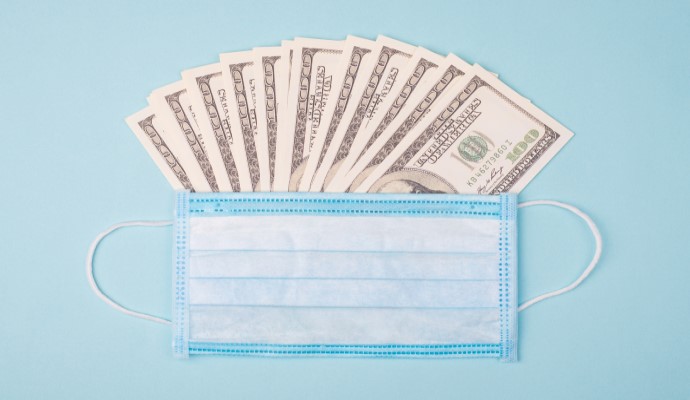Complex COVID-19 Hospitalizations Cost an Average of $300K
While the previously estimated cost for COVID-19 hospitalizations was around $20,000, new data suggests that costs can range up to 15 times that figure.

Source: Getty Images
- COVID-19 hospitalizations can cost up to $318,000, according to new cost estimates from FAIR Health.
The FAIR Health Total Treatment Cost COVID-19 benchmarks account for the costs incurred by COVID-19 treatment from start to finish. The benchmarks divide the cases into three categories, including hospitalization with complexities, general hospitalization, and non-hospitalization.
FAIR Health updates the benchmark data twice a year to reflect a 12-month window of claims.
According to the latest benchmarks update, the average charge for a COVID-19 hospitalization with complexities is $317,810. The average estimated allowed amount is $98,139.
A hospitalization with complexities is characterized as a stay in which the patient requires inpatient services such as laboratory tests, specialty drugs, durable medical equipment like ventilators, and radiology and intensive care unit room and board.
It also encompasses any stay that received outpatient and provider services such as follow-up visits, radiology services, echocardiography procedures, and immunology procedures. Patients with a coronavirus-related hospital admission averaged 3.2 outpatient visits, one study of Medicare patients found.
A general hospitalization, which consists of similar services, has an average cost of $74,591 and an average estimated allowed amount of $33,525, according to FAIR Health’s cost estimates.
For comparison, COVID-19 non-hospitalizations cost an average of $2,557 and incur an average estimated allowed amount of $1,008. These visits include labs, radiology, office visits, and cardiography procedures.
FAIR Health also reported on the median costs of COVID-19 hospital visits which amounted to $2,289 for non-hospitalizations, $54,626 for general hospitalizations, and $208,136 for complex hospitalizations.
The median estimated allowed amount for non-hospitalizations, general hospitalizations, and complex hospitalizations were $893, $25,188, and $70,098, respectively.
This data provides new insights into just how much patients and payers are spending on COVID-19 hospitalizations, especially since the overall estimated costs have been much lower.
A Peterson-KFF Health System Tracker brief put the cost of COVID-19-related hospital admissions at around $20,000.
In July 2020, CMS reported that individual Medicare payments for fee-for-service COVID-19 hospitalizations ranged from $5,248 to $70,685, with Medicare paying providers an average of $25,255.
More than 250,000 COVID-19 hospitalizations this summer were preventable, a Kaiser Family Foundation brief found. Nearly all of the hospitalizations between June and August 2021 were among unvaccinated individuals.
The brief found that these preventable hospitalizations cost the healthcare system almost $6 billion in three months, but that was based on the assumption that the average cost of hospitalization was $20,000.
The new data on hospitalization costs, coupled with the over 30 percent of Americans who remain unvaccinated may lead to even higher healthcare spending across the country.
FAIR Health is launching an online COVID-19 cost tracker in October that will provide interactive maps for users to view hospitalization cost estimates by state for each of the three categories. The tool aims to provide valuable insights into healthcare spending, the press release stated.
“FAIR Health strives to make its data relevant and actionable, in this case with up-to-date information on the total costs of care for patients diagnosed with COVID-19, Robin Gelburd, president of FAIR Health, concluded in the press release.
“We are excited to soon share a more detailed version of this information as a free resource on our website in the hope that it will be useful to the public as the pandemic further evolves.”
